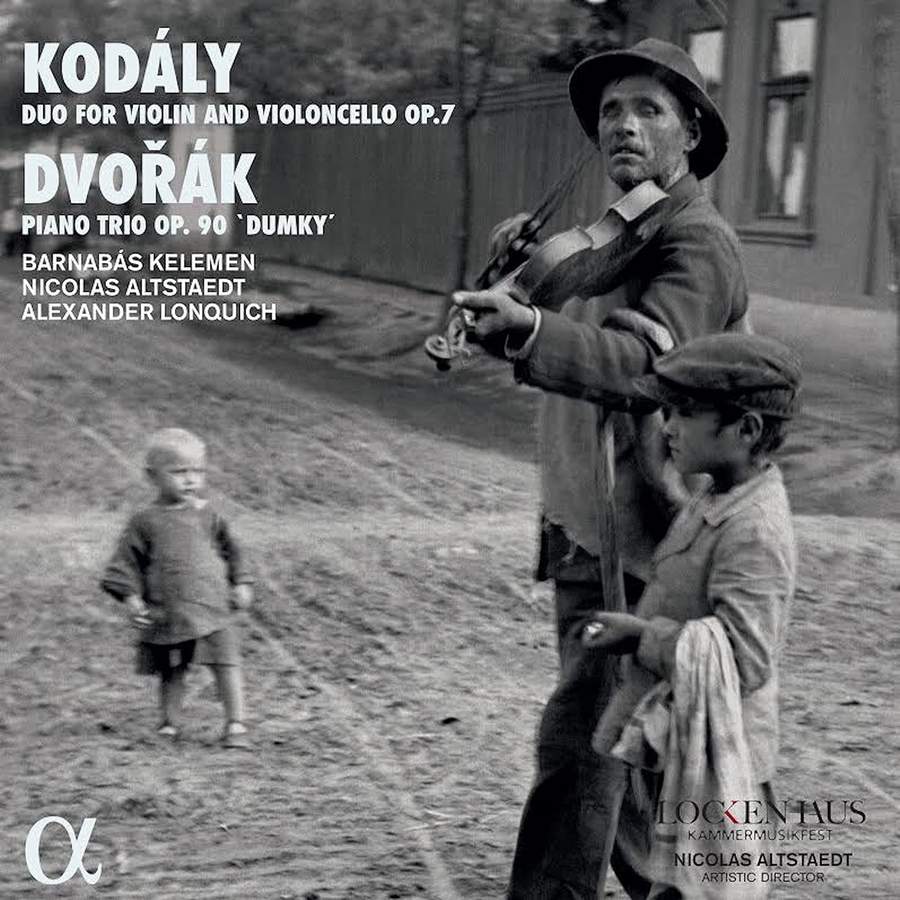DVORÁK Piano Trio Op 90 'Dumky' KODÁLY Duo for Violin and Violoncello
View record and artist detailsRecord and Artist Details
Genre:
Chamber
Label: Alpha
Magazine Review Date: 09/2021
Media Format: CD or Download
Media Runtime: 59
Mastering:
DDD
Catalogue Number: ALPHA737

Tracks:
| Composition | Artist Credit |
|---|---|
| Duo |
Zoltán Kodály, Composer
Barnabás Kelemen, Violin Nicolas Altstaedt, Cello |
| Piano Trio No. 4, 'Dumky' |
Antonín Dvořák, Composer
Alexander Lonquich, Piano Barnabás Kelemen, Violin Nicolas Altstaedt, Cello |
Author: Rob Cowan
The only other violinist who in my experience ignites imagined rustic campfires as vividly as does Barnabás Kelemen is Grigoraș Dinicu, and then only on old recordings of relatively short folk pieces. Kelemen has the passion, the imagination, the intelligence, the sense of place and ethnicity, the style and the all-facilitating technique to bring the ‘earth-and-air’ masterpieces of Bartók and Kodály fully to life, the loose-limbed manner of his phrasing as flexible as any folk fiddler, his tonal range and the agility of his bow varying from bar to bar. No player currently treading the boards is quite as exciting and this extraordinary disc finds him in intimate and animated musical conversation with like-minded musicians.
The Kodály Duo has been handsomely served on disc by the likes of János Starker and Arnold Eidus (Period, vinyl) and Jascha Heifetz and Gregor Piatigorsky (RCA) but fine as they are, Kelemen and cellist Nicolas Altstaedt play the improvisatory card with either rapt intensity or wild abandon. In the finale, the woozy meno mosso section is taken more swiftly than usual, accentuating the impression of bleary-eyed inebriation. The impassioned second movement enjoys considerable interpretative freedom on the part of both players, especially when they alternate arpeggios with declamation. Kelemen has much personal experience with different styles of folk music that bear a strong resemblance to what can be heard in this piece, and that experience tells. His way with Kodály is more Bartókian than most – darker, more aggressive and rhythmically pungent.
Dvořák’s Dumky Trio is equally arresting. Try the fourth movement, which tiptoes into earshot as played by pianist Alexander Lonquich before his string-playing colleagues quietly join him. Then witness the sense of play at around 0'47", before (temporarily) returning to a mood of relative sobriety. These players make the work sound like a cross between high-class café music (witness Kelemen’s seductively heated tone at the start of the third movement), chamber masterpiece and poetic tragedy. We’re also treated to the first recording of the incomplete but musically rewarding first version of ‘Dumka III’.
In a fascinating booklet essay on the dumka form, Altstaedt writes: ‘Through the appalling events of the 20th century, the “dumky” have become a requiem. This recording is dedicated to those epic songs and their performers, with the inscription: À la mémoire des grands artistes.’ Doubly so, I’d say, given our communally troubled existence since early 2020. These are wonderful performances, outspoken for the sake of the music rather than for the artists’ sakes, and the sound is superb.
Discover the world's largest classical music catalogue with Presto Music.

Gramophone Digital Club
- Digital Edition
- Digital Archive
- Reviews Database
- Full website access
From £8.75 / month
Subscribe
Gramophone Full Club
- Print Edition
- Digital Edition
- Digital Archive
- Reviews Database
- Full website access
From £11.00 / month
Subscribe
If you are a library, university or other organisation that would be interested in an institutional subscription to Gramophone please click here for further information.




